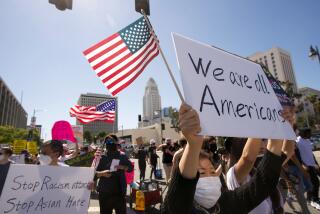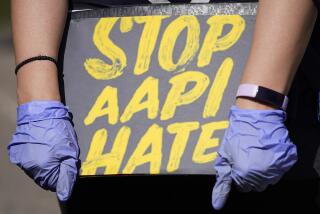Japan-Bashing Condemned by Rights Panel
- Share via
WASHINGTON — When politicians criticize Japan because of U.S. economic problems, their comments often trigger acts of bigotry and violence directed at Asian-Americans, a two-year investigation by the U.S. Commission on Civil Rights has found.
In a 233-page report, “Civil Rights Issues Facing Asian Americans in the 1990s,” the commission said Friday that “political leaders contribute to the problem when they unthinkingly lash out at Japan as the cause of the United States’ economic difficulties.”
It offered 44 recommendations for stemming the violence. Among them: that political leaders in both parties refrain from using Japan as a scapegoat for U.S. domestic problems in upcoming election campaigns.
The commission’s study is based on a series of round-table discussions in 1989 in San Francisco, Houston and New York. Copies of the report have been presented to the White House and both chambers of Congress.
“Japan-bashing is on the rise across this nation,” Commission Chairman Arthur A. Fletcher said in a statement released Friday to coincide with the study. “While Asian-Americans have lived in the United States for centuries and became targets of racial hatred and violence soon after their arrival, our report reveals that Asian-Americans continue to suffer widespread prejudice, discrimination, denials of equal opportunity and physical attacks.”
Dennis Hayashi, national director of the Japanese American Citizens League in San Francisco, praised the commission for linking political rhetoric with violence against Asian-Americans. “That’s something we’ve been saying for some months now. . . “ he said. “In particular, we feel this ‘Buy American’ campaign that’s spreading across the nation is the cutting edge of anti-Asian prejudice that leads to anti-Asian violence.”
In largely anecdotal form, the report described several recent cases of bigotry that resulted in violence, harassment, vandalism, intimidation and racial slurs directed at Asian-Americans.
The study lamented the fact that federal and local record-keeping on hate crimes is, at best, spotty and failed to provide the commission reliable documentation of racially motivated crimes against Asian-Americans and other minority groups. However, the study predicted that record-keeping mandated by the Hate Crimes Statistics Act of 1990 would provide evidence of racially motivated crimes in the future.
In Los Angeles, where officials have tracked hate crimes against minorities since 1980, Asian-Americans were the victims of 14.9% of all such reported crimes in the years officials have maintained data. In comparison, black Americans are victims of 62% of such crimes, the report stated.
Ron K. Wakabayashi, executive director of the Los Angeles City Human Relations Commission, said Friday that there seems to be a shift in the type of bigoted and violent acts against Japanese-Americans.
“This is not science, but my own observations,” Wakabayashi said. “In the past 15 years, it has been chance encounters, more of a random nature. The pattern within the last three months has been much more targeted hits--homes, community centers, senior centers.”
Wakabayashi attributed the change to the downturn in the local economy, media coverage of the 50th anniversary of the World War II Japanese attack on Pearl Harbor and the controversy over the purchase of Japanese-made vehicles for the Green Line mass transit system, among other things.
An example of violence against Asian-Americans described in the report included the 1982 murder of Vincent Chin in Detroit, who died from injuries suffered in a barroom beating by two white auto workers who blamed him for the loss of jobs in the auto industry.
The commission said that “blame for the bigotry and violence” suffered by Asian-Americans “must be shared” by many influential groups within American society, including the business, education, media and political leadership.
For example, the report singled out the nation’s news media for unfairly characterizing Asian-Americans as the nation’s “model minority,” a depiction that stigmatizes them as overly hard-working, intelligent and successful.
“As complementary as it might sound, this stereotype has damaging consequences,” the report said, noting that mistaken perceptions divert attention from problems affecting many Asian-Americans and excuses discrimination that limits even the most successful Asian-Americans.
Furthermore, the report stated, the media often overlook racism directed at Asian-Americans. It noted, for instance, that reporters emphasized the gun-control angle in the 1989 mass murder of schoolchildren in Stockton, but ignored the racial implications of the shooting. In that incident, Patrick Edward Purdy repeatedly fired an AK-47 assault rifle into a playground, killing five Indochinese children and wounding 30 others, before turning the weapon on himself.
“The possibility that the killings were racially motivated was hardly addressed in the national press,” the report stated, adding that nearly a year later then-California Atty. Gen. John K. Van de Kamp concluded that the killings “were driven by a hatred of racial and ethnic minorities.”
The commission’s report urged federal, state and local governments to review laws protecting the rights of more than 7.3 million Asian-Americans.
Among other recommendations:
--Local and state governments should review whether their laws adequately protect the rights of Asian-Americans and others.
--The media should make concerted efforts to increase public awareness of incidents of anti-Asian-American hate crimes.
--Political leaders should refrain from remarks, such as “Japan-bashing,” that play upon ethnic bias.
--Police departments should provide enhanced training for their officers and community outreach to ensure that hate crimes are correctly recognized, reported and recorded.
--Colleges and universities, in conjunction with the federal Department of Education, should recruit and train bilingual teachers, especially for languages spoken by Southeast Asians.
--Public schools should become aware of racial tensions and take steps to defuse them.
The commission also said that the Justice Department’s Community Relations Services is “the logical agency” to coordinate a “national effort to promote understanding for Asian-Americans, particularly immigrants, and to prevent hate activities against them.”
More to Read
Sign up for Essential California
The most important California stories and recommendations in your inbox every morning.
You may occasionally receive promotional content from the Los Angeles Times.













